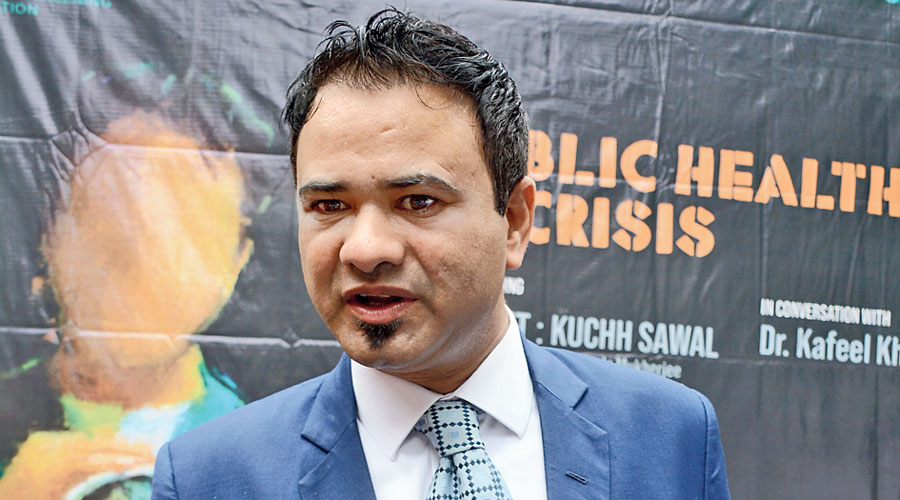Sir — The doctor from Uttar Pradesh, Kafeel Khan, a victim of political conspiracy, has now been released from prison on the order of the Allahabad High Court (“Hope again”, Sept 7). He was detained under the National Security Act earlier this year for criticizing the Citizenship (Amendment) Act and its discriminatory nature. The court found that far from being provocative, the speech, read in its entirety, does not even reveal an effort to promote hatred or violence. The only explanation, then, is that the NSA was invoked to avoid his release in keeping with the February court order.
The verdict exposes the state government’s vindictive attitude towards a particular community. The use of national security laws against dissenters, arbitrarily and in the absence of evidence, should be condemned. Khan has been hounded and persecuted by the government ever since the 2017 incident at a medical college in Gorakhpur where a number of children lost their lives. He was then arrested on charges of negligence and corruption even though circumstances indicated his strenuous efforts to ensure continuous oxygen supply. He spent months in prison before an inquiry absolved him of the charges but his suspension has not yet been revoked.
There is reason to believe that Khan was persecuted because the chief minister of Uttar Pradesh, Yogi Adityanath, had a grudge against him. His trigger-happy police force inflicted insufferable torture on Khan in jail. The court has corrected an act of injustice and put an end to the harassment of a citizen on political grounds, at least for now. There is no guarantee that vindictive political leaders will not implicate him under other trumped-up charges. That would surely be a defeat of India’s democratic values.
S.S. Paul,
Nadia
Sir — Last week, the Allahabad High Court ordered the release of Kafeel Khan, denouncing his illegal arrest under the NSA. In a similar case, the Delhi High Court granted bail to Devangana Kalita, a student of Jawaharlal Nehru University, in one of the cases lodged against her — she remains in prison as charges under the Unlawful Activities (Preventive) Act have not yet been repealed. In both cases, the respective high courts observed that adequate evidence of incitement to violence had not been furnished against the accused.
In India, the use of draconian laws such as the NSA and the UAPA to book people under various false charges seems to have become common. While some of the accused are later found to be ‘not guilty’, many continue to languish in jails. Meanwhile, activists across the country have condemned the indiscriminate use of such laws, claiming that these have been misused over the years and that states should thereby refrain from invoking these unless there is substantive evidence against the accused. Indeed, the abuse of such laws is dangerous to democracy. Even though the immediate arrest of a suspect is not mandatory under the law, there are enough cases where arrests are made in order to frame innocent people or to subject them to harassment. In this respect, the cases of Khan and Kalita can serve as eye-openers. All state governments should review their position immediately and release those people who have been unnecessarily detained under these laws.
Khokan Das,
Calcutta
Sir — Kafeel Khan’s account of the torture inflicted upon him in prison is horrifying (“‘Safe’, Kafeel lists torture”, Sept 4). It appears that a false case was lodged against Khan simply because he tried to expose the flaws in the system following the death of a number of children at a Gorakhpur hospital. A benevolent doctor seems to have been treated like a criminal by a vindictive system — Khan alleged that he even used to be hung upside down and beaten while he was in jail.
The judgment of the Allahabad High Court exonerating him of the charges signifies the defeat of a vengeful state government and the victory of truth and justice at a very dark time. Only a few people dare to speak up against the prevailing injustices in society; the rest choose to remain silent. The latter seem to be progressively outnumbering the former, possibly owing to the fear of retaliation. But when dissenting voices are gagged, the very foundations of democracy and secularism begin to shake. This is what is plaguing the country at present.
Serajuddin-Khurram,
Calcutta
Step up
Sir — Last week, the name of the cartoon character, Shinchan, appeared at the top of a merit list put up by a college in West Bengal. This was shortly after the names of an actress and a singer were posted in the admission lists of some other colleges. While this may seem funny at first, it reveals the fragile condition of online infrastructure in the state. This is especially worrying at a time when online education seems to be the only way forward, as schools and colleges remain closed owing to the pandemic. The education ministry must step up its game and address the gaps in the system at once.
Arghya Roy,
Calcutta

